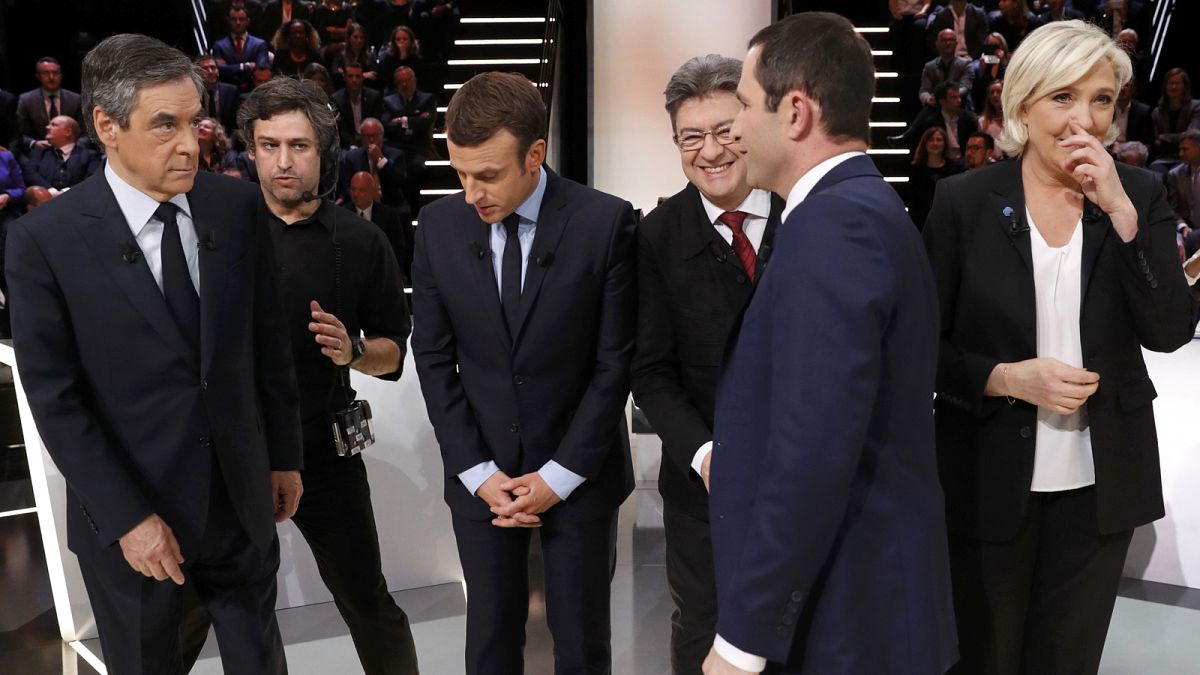France's first of three televised presidential debates. Who said what, to whom and which of the five candidates performed the best
A televised presidential debate between the five principal candidates before the election’s first round in April was a milestone in French politics. It was something never seen before.
It offered a refreshing platform on which the candidates could focus on their politics in a campaign that has been mired in recent weeks by judicial investigations and scandals. But it hardly convinced the nearly 15 million voters who, after this first of three debates, remain undecided.
Several daily newspapers in France judged the debate was not decisive. Neither candidate shone brighter than the other and, during the debate’s first hour, was lacking in energy before barbs were eventually traded on secularism in France, immigration and the role of Russia on the international stage.
Communications experts, cited by Agence France Presse, said they thought the three-hour long televised debate was too long.
“On social media everyone has lost interest by the third part,” said Anne-Claire Ruel, from the blog Fais pas Com Papa.
“The length of the debate neutralised any positive or negative effect,” said Thierry Herrant, from consultancy firm Equancy. “The section reserved for ‘France in the world’ arrived too late and the candidates had less energy.”
Francois Fillon, from the Republican party presented himself as “the candidate for France’s national recovery.” According to observers, he performed well during the debate despite being embroiled in a formal investigation probing claims he hired his wife for a fictitious job. During the debate he said he has few regrets, only admitting that he “might have committed errors.”
Benoit Hamon, from the Socialists promised to be a “president not swayed by financial contributions and political lobbies.” He was well-spoken and pedagogical but stayed too far back and didn’t attack.
Emmanuel Macron, from the centrist En Marche party proposed a “project of profound alternation with new uses and new faces.” He showed he could listen and consider the arguments of his rivals, but struggled to explain himself using simple words.
Marine Le Pen of the far-right Front Nacional declared she would be the “president of the French republic, truly.” Not surprisingly she used a firm, if sometimes mocking tone, but directly addressed those voters either disappointed or angry at the country’s current state of affairs.
Jean-Luc Melenchon, of the far-left La France insoumise indicated if he were president he’d end the “presidential monarchy”. Out of the other candidates on the stage, he was the one that generated the most social media reactions and traffic.
It is Emmanuel Macron who, leading the polls with Marine Le Pen, suffered the most “shots” fired by his opponents.
Hamon attacked him on the financing of his campaign, accusing Macron of accepting “donations from people who belong to big groups who could tomorrow tie us up”. The centrist candidate shot back: “I take the engagement to not be bought by anyone (…) The financing of my campaign is transparent”.
Marine Le Pen mocked Macron’s discourse as “sidereal emptiness”. “You do not understood that unlike you, I do not want a pact with Mr. Putin”, retorted the former economy minister. “Unlike you, I want a France that is strong in Europe, which I fully assume, is our biggest disagreement”, replied Le Pen.
Francois Fillon attacked Marine Le Pen on her economic platform: “The real serial killer, is Marine Le Pen with her plan to leave the euro, rampant inflation…”
The former prime minister, who maintains good relations with Russian President Putin, defended Russia on the issue of borders: “There are borders that have been drawn in unacceptable conditions, which have separated people, and this is a topic which we cannot refuse to discuss.”
Jean-Luc Melenchon felt it necessary to call a spade a spade, reminding the audience Le Pen and Fillon are the subject of judicial investigations. “It is not forbidden for voters, knowing what they know”, he said, “to reward the virtuous and to punish those who do not seem to be.”
The debate hit a critical juncture on the topic of secularism in France.
Le Pen explained that she “does not recognise communitarians”, provoking a reaction from Hamon: “Ah yes, secularism, as it suits you!” Her comment also provoked Melenchon who piled onto criticism of Le Pen: “You cannot go so far as to establish police rules on clothes. Do you have the intention to prevent people from wearing green hair?”.
